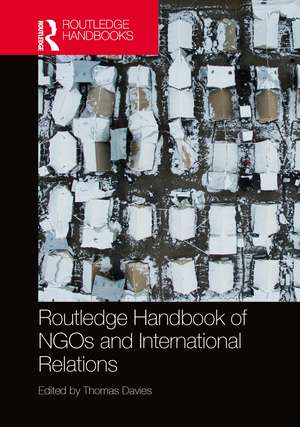Routledge Handbook of NGOs and International Relations
Editat de Thomas Daviesen Limba Engleză Paperback – 31 mar 2021
Including perspectives from multiple world regions, the book takes account of institutions in the Global South, alongside better-known structures of the Global North. International contributors from a range of disciplines cover all the major aspects of research into NGOs in International Relations to present:
- a comprehensive overview of the historical evolution of NGOs, the range of structural forms and international networks
- coverage of major theoretical perspectives
- illustrations of how NGOs are influential in every prominent issue-area of contemporary International Relations
- evaluation of the significant regional variations among NGOs and how regional contexts influence the nature and impact of NGOs
- analysis of the ways NGOs address authoritarianism, terrorism, and challenges to democracy, and how NGOs handle concerns surrounding their own legitimacy and accountability.
Exploring contrasting theories, regional dimensions, and a wide range of contemporary challenges facing NGOs, this Handbook will be essential reading for students, scholars, and practitioners alike.
| Toate formatele și edițiile | Preț | Express |
|---|---|---|
| Paperback (1) | 304.96 lei 6-8 săpt. | |
| Taylor & Francis – 31 mar 2021 | 304.96 lei 6-8 săpt. | |
| Hardback (1) | 1002.86 lei 6-8 săpt. | |
| Taylor & Francis – 18 apr 2019 | 1002.86 lei 6-8 săpt. |
Preț: 304.96 lei
Nou
Puncte Express: 457
Preț estimativ în valută:
58.35€ • 61.08$ • 48.57£
58.35€ • 61.08$ • 48.57£
Carte tipărită la comandă
Livrare economică 31 martie-14 aprilie
Preluare comenzi: 021 569.72.76
Specificații
ISBN-13: 9780367783860
ISBN-10: 036778386X
Pagini: 684
Dimensiuni: 174 x 246 x 39 mm
Greutate: 1.27 kg
Ediția:1
Editura: Taylor & Francis
Colecția Routledge
Locul publicării:Oxford, United Kingdom
ISBN-10: 036778386X
Pagini: 684
Dimensiuni: 174 x 246 x 39 mm
Greutate: 1.27 kg
Ediția:1
Editura: Taylor & Francis
Colecția Routledge
Locul publicării:Oxford, United Kingdom
Public țintă
Postgraduate and UndergraduateCuprins
Introducing NGOs and International Relations PART I: History and Contributions 1. The Emergence of NGOs as Actors on the World Stage 2. NGOs’ Interactions with States 3. NGOs in Global Governance 4. Transnational Non-State Politics PART II: Theory and Analysis 5. Constituting NGOs 6. Rationalist Explanations for NGOs 7. NGOs and Post-Positivism: Two Likely Friends? 8. NGOs in Constructivist International Relations Theory 9. The Aesthetic Politics of NGOs 10. NGOs and Social Movement Theory 11. International NGOs in Development Studies 12. NGOs and Management Studies 13. NGOs in International Law: Reconsidering Personality and Participation (again) 14. Voluntaristics: Global Research on NGOs and the Non-Profit Sector 15. Primary Data on NGOs: Pushing the Bounds of Present Possibilities PART III: Issue-Areas and Sectors 16. Feminist Politics and NGO Mobilization: Can NGOs Degender Global Governance? 17. NGOs and Labour 18. NGOs and Human Rights 19. Humanitarian NGOs 20. Five Generations of NGOs in Education: From Humanitarianism to Global Capitalism 21. The Roles of the Citizen Sector in Health and Public Health 22. NGOs and Peace 23. NGOs and the Environment 24. Civil Society, Expert Communities, and Private Standards 25. An Uncomfortable Relationship: NGOs, Trade Associations, and the Development of Industry Self-Regulation 26. NGOs and Global Trade 27. NGOs and Professions 28. Religiously Affiliated NGOs PART IV: Regional Perspectives 29. Transnational NGOs in the United States 30. NGOs in the European Union 31. The Non-Profit Sector in Eastern Europe, Russia, and Central Asia 32. NGOs in East and Southeast Asia 33. NGOs, Democracy and Development in Latin America 34. Civil Societies and NGOs in the Middle East and North Africa: The Cases of Egypt and Tunisia 35. NGOs in Sub-Saharan Africa: Potentials, Constraints and Diverging Experiences 36. NGOs in South Asia PART V: Contemporary Challenges 37. Democracy and NGOs 38. NGOs and Authoritarianism 39. NGOs and Security in Conflict Zones 40. NGOs and the Challenge of Global Terrorism 41. International NGO Legitimacy: Challenges and Responses 42. NGO Accountability
Notă biografică
Thomas Davies is a Senior Lecturer in the Department of International Politics at City, University of London. He researches NGOs, social movements, global governance, and transnational history. His publications include NGOs: A New History of Transnational Civil Society and The Possibilities of Transnational Activism.
Recenzii
"This timely and important book provides a comprehensive and compelling look at the role of NGOs in international relations. Pushing against disciplinary silos, it brings together a first rate group of scholars to reflect upon the role of NGOs in a vast number of issue areas and regions of the world. It is essential reading for everyone interested in ‘politics beyond the state’." Erin Hannah, King's University College, Western University, Canada.
"An comprehensive and timely collection of essays about the growing and crucial role of non-state actors in world politics. Routledge Handbook of NGOs and International Relations has insights for politicians, pundits, and the public as well as analysts of global governance. This excellent overview provides one-stop shopping for a phenomenon that challenges the contours of our understanding about contemporary transnational interactions." Thomas G. Weiss, The CUNY Graduate Center, New York, USA.
"An comprehensive and timely collection of essays about the growing and crucial role of non-state actors in world politics. Routledge Handbook of NGOs and International Relations has insights for politicians, pundits, and the public as well as analysts of global governance. This excellent overview provides one-stop shopping for a phenomenon that challenges the contours of our understanding about contemporary transnational interactions." Thomas G. Weiss, The CUNY Graduate Center, New York, USA.
Descriere
Offering insights from pioneering new perspectives, this Handbook considers the activities not only of advocacy groups in the environmental, feminist, human rights, humanitarian, and peace sectors, but also the array of religious, professional, and business associations that make up the wider NGO community.
